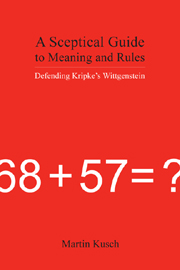Book contents
3 - Dispositions and extensions
Summary
Introduction
The argument of WRPL against reductive semantic dispositionalism can be reconstructed as having two prongs. (In this chapter, “dispositionalism” always means “reductive semantic dispositionalism”.) The first prong is the claim that dispositionalism fails the intensional requirement: it fails to show that having the disposition to use a sign “y” under conditions C intuitively resembles meaning X by “y”. This criticism is tantamount to saying that dispositionalism is unable to do justice to semantic normativity. The second prong of the argument against dispositionalism is that it is unable to meet the extensional requirement: it does not succeed in identifying dispositional predicates that logically co-vary with meaning predicates. The need to meet this second requirement follows from the meaning-determinist commitment to objectivity.
I discussed the intensional requirement in Chapter 2, confirming and building on the negative assessment of WRPL. In this chapter I turn to the extensional requirement. Kripke's use of the extensional requirement as a weapon against dispositionalism has been discussed frequently in the literature, and with little sympathy. Almost all commentators feel that the extensional requirement can be met either within the confines of the original intuitive picture of meaning determinism or by relaxing some of the latter's demands. In discussing these positions, we need not distinguish sharply between original meaning determinists, reformers and revolutionaries. For the most part I shall allow that any element of meaning determinism can be relaxed or dropped, as long as the extensional requirement is still met.
- Type
- Chapter
- Information
- A Sceptical Guide to Meaning and RulesDefending Kripke's Wittgenstein, pp. 94 - 126Publisher: Acumen PublishingPrint publication year: 2006



